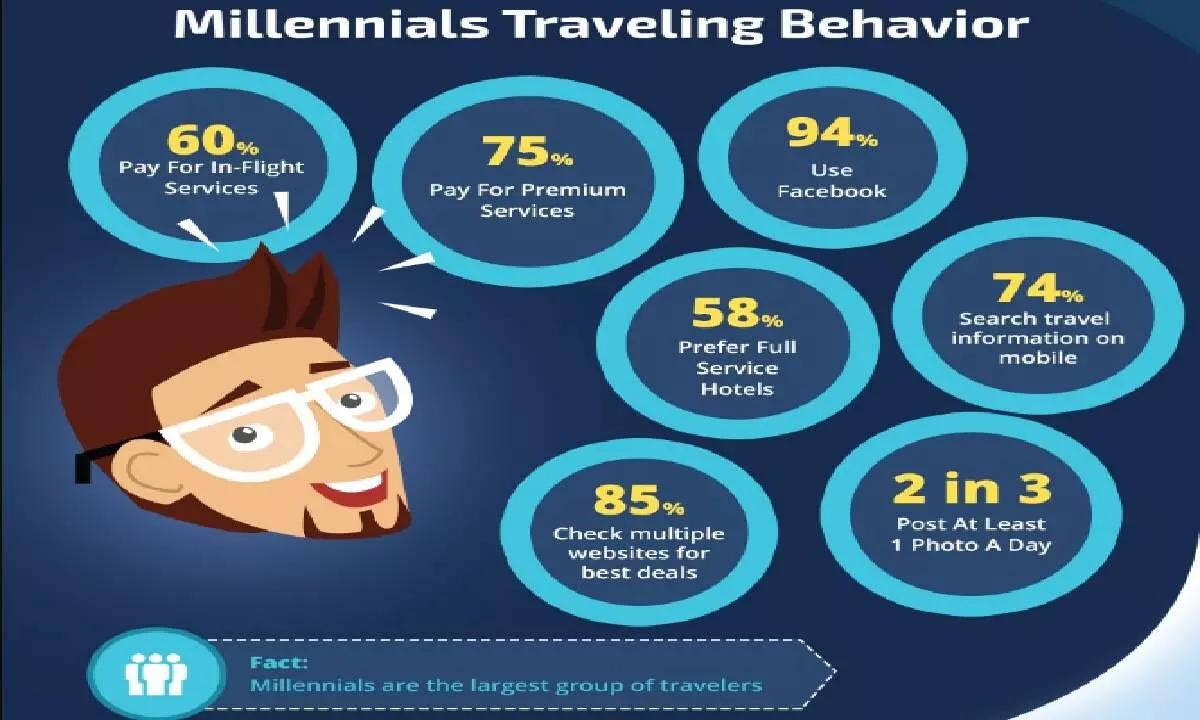It’s all about engaging millennials who are reshaping the travel industry
Trips closest to the local traditions delight this generation that craves for cultural enrichment
image for illustrative purpose

Younger travellers, specifically Millennials (born between 1982 and 1995) and Generation Z (born between 1995 and 2015), have been reshaping the travel industry. Millennials embrace products and services that improve not only their quality of life but also that of society. This generation is in deep search of meaning and is committed to brands that make a difference to the society.
They consume with an awareness of tomorrow's world and therefore of the potential impact (environmental, social, economic...) of their purchases. Replanting trees, contributing to humanitarian projects, being concerned about employees' working conditions can be part of your offer's ‘goal’.
They possess have a mobile-first behaviour, with strong preference for experience-based travel and their Instagram-documented lifestyles. They seek experiences, unique and photo-ready, are a new form of social currency for these younger generations; 57 per cent of millennials, for example, have made travel plans based on an image or video they saw on a friend’s post. And both millennials and Gen Z travellers increasingly seek experience-based travel.
Millennials have more spending power than any other generation and Gen Z already accounts for between $29 and $143 billion dollars’ worth of direct spend, annually. Combine their purchase power with the fact that millennials and Gen Z travel more than any other generation and you know why marketers are eager to appeal to these two groups of young travellers.
Both generations seek authenticity. When creating content that is meant to appeal to them, it is essential to cut through the inauthentic noise that is omnipresent on social channels. For 60 to 80% of millennial travelers, authenticity is the number one criterion in choosing a trip. Trips as close as possible to the local culture, with local facilities, will delight this generation in search of meaning and cultural enrichment.
Generation Y doesn't just want to see the Eiffel Tower, it wants to see the Eiffel Tower with a Frenchman, who explains his life in Paris. This search for authenticity also meets a need for personalization and nourishes the impression of the millennial of being off the beaten track, of having avoided the so-called "too touristy" places.
"Relaxed" is a term that comes up regularly to characterize the millennials. People between the ages of 18 and 35 prefer fun, joyful and intense experiences to the benefit of ownership (of cars, real estate, objects...). They are conscious, hedonistic and live their present lives to the fullest; they seek strong emotions and thrills in everything they experience. "YOLO"[You Only Live Once] is their motto!
The millennial travelers are not consumers of packaged products at all. That's it! Not only do they like to access customized services and products, including trips, but they are also very attached to their self-reliance. They are liberal, mobile and prefer flexibility to comfort. Hence, the success of road trips! It is better to focus on a self-guided tour with suggested routes and local experiences, rather than an all-inclusive stay in a club!
"Instagrammability" is a key factor that millennials seek in their travel experiences, and Gen Z travelers are following in their footsteps. Influenced by the photogenic appeal of destinations and accommodation, this trend is causing a major shift- both in the bucket-list destinations that Gen Zers choose to travel to, as well as the activities they prefer to engage in once at those destinations.
The visual allure of a destination plays a major role in travel decision-making for Gen Z.
The "Instagram-worthiness" of a place often ranks high on Gen Z travelers' list of priorities when choosing where to visit. Places that translate into eye-catching and shareable photos are the first thing many Gen Z guests are drawn to. As they share their dream-vacation photos on Instagram, this, in turn, catches the eyes of their friends, creating a self-sustaining loop of organic marketing.
Many hospitality businesses have therefore started leveraging Instagrammable features to attract travel-happy millennials and Gen Z consumers. Marketing campaigns often highlight scenic viewpoints, unique street backdrops and landmarks with interesting architecture.
There are several ways that hospitality and travel brands can make themselves more appealing to bleisure travelers. Creating spaces and organizing events where leisure travelers can network and connect is one way. Others include developing special packages that combine business amenities with leisure activities; providing special perks for extending stays beyond work-related commitments; and providing a concierge service to assist bleisure travellers in planning leisure activities, making reservations and navigation.
Simplifying the billing process for bleisure travelers, who need to separate business expenses from leisure costs, is very important to ensure a good word of mouth promotion and repeat bookings.

